In case you missed it, our new location is 601 S California at the Westside Justice Center
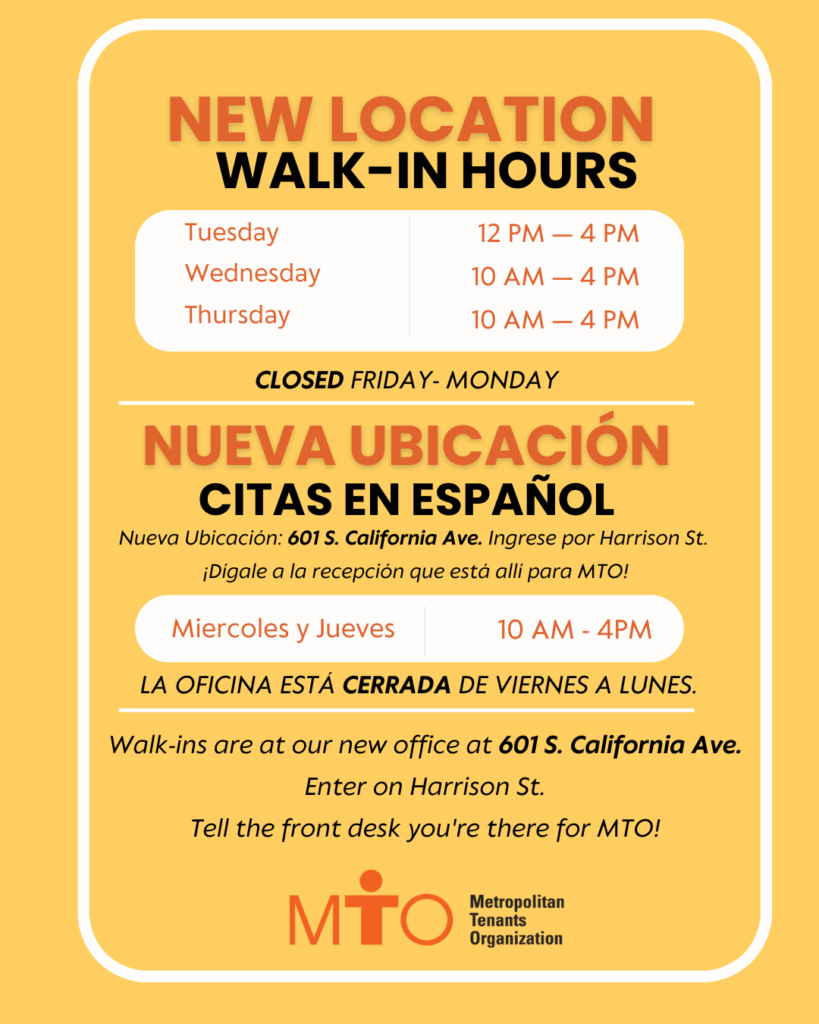
News and updates from MTO.
In case you missed it, our new location is 601 S California at the Westside Justice Center

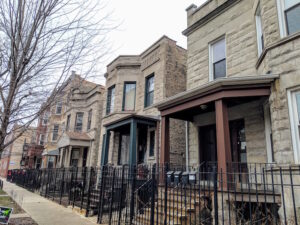
When Naeema moved into her new apartment, she was excited and thinking about the future in her new home. Within the first month, problems began appearing: the toilet would not flush, water pressure was not enough for a proper shower, and roaches scuttled across her floors.
Despite multiple attempts to get her property manager to address these problems, her concerns went unanswered, leaving her feeling stuck and frustrated. That is when Naeema reached out to MTO for help. After listening to her concerns, hotline counselors explained her rights under the Residential Landlord and Tenant Ordinance (RLTO), including her remedies for dealing with a neglectful landlord and her right to complain to Chicago’s Department of Buildings for an inspection.
With this information, Naeema felt empowered to act. Together, we helped her draft a letter to the management company detailing the issues and her rights as a tenant. The results were immediate.
Management agreed to let Naeema out of her lease without penalty and offered to refund her first month’s rent and move-in fee. Following this breakthrough, Naeema conducted a walkthrough of the apartment with the property manager. The unit was in the same condition as when she moved in, and the manager confirmed the refund and lease termination. Within that same week, Naeema picked up her refund check, covering her first month’s rent and move-in fees in full. She then moved out, leaving behind the stressful conditions and regaining peace of mind. Naeema’s persistence, combined with the right support and knowledge of her tenant rights, turned a demanding situation into a positive resolution. Now, she is ready for a fresh start in a home that meets her needs.
 When a child is harmed by lead within the home, family life gets immediately upended. This was true for Michael and Eileen Buchanan, whose 14-month-old tested positive for elevated blood lead levels. A Chicago city inspector confirmed high lead levels throughout their unit.
When a child is harmed by lead within the home, family life gets immediately upended. This was true for Michael and Eileen Buchanan, whose 14-month-old tested positive for elevated blood lead levels. A Chicago city inspector confirmed high lead levels throughout their unit.
Right away, Mr. and Mrs. Buchanan changed their lives to protect their child’s health. The Buchanan family began to look for a safe, lead-free place to move. Since they had neither the means nor the opportunity to move immediately, they altered their apartment unit. Their once-cozy home became unrecognizable.
The Buchanans, when possible, traveled to Michigan at their own expense to stay with family and to avoid their unit. Medical bills piled up. Mr. Buchanan had to take off work to focus on taking care of his 14-month-old, putting his job at risk. Adding to the stress was the terror of not knowing how the lead would impact their child, and whether their child would experience long-term health consequences commonly associated with elevated blood lead levels. With help from MTO’s Healthy Homes Organizer, LiMei Vera, and MTO’s Staff Attorney, Philip DeVon, the Buchanans were able to successfully negotiate with their Landlord. While they secured a lease termination agreement and ample relocation assistance, they did not come out unscathed.
The Buchanans’ story is representative of a larger problem faced by tenants in Chicago: without proactive inspections, great responsibility falls on tenants to protect their children from invisible hazards in the unit. When their children are harmed by lead in the unit, they must abruptly make great adjustments in order to keep their children safe. These adjustments are costly – both in terms of time and money – and occur during a time of emotional distress and turmoil. With stories like the Buchanans’ happening throughout the city, our response is clear: we need proactive inspections of all rental units in order to protect children and their families from hazards in the home.
Story By LiMei Vera
When the Bolin family moved into their Lincoln Square apartment in the 47th Ward, they believed they had found the perfect place for their young family. The apartment was affordable and offered a place to grow their roots. They registered their lively two-year-old son for local art and swim classes and prepared to welcome their daughter.
However, after a year in the apartment, their son began experiencing health problems: he abruptly lost his appetite, had trouble sleeping, and started displaying seemingly inexplicable behavioral changes.

A visit to the doctor gave the Bolin family an unexpected answer: their son had elevated blood lead levels. For children his age, lead attacks the brain and central nervous system. It can cause irreversible damage, contributing to long-term developmental delays and complex behavioral disorders.
For John Bolin, the news was terrifying:
“We’re his parents and are supposed to keep our children safe. Finding out that it’s in your house, and that the one place that should be the safest place for them to be is actually the worst place for them to be, is incredibly upsetting and scary.”

A city inspector confirmed that the Bolin family’s apartment contained dangerous lead levels in the windows, door casings, doors, stairwells, and walls. No amount of lead exposure is considered safe for children under the age of six, but the Bolins’ home contains 58 times the allowable limit.
While this story is haunting, it is all too common in a city that does not mandate proactive inspections of rental units. In Chicago, units are not typically tested for lead until after a child has already been poisoned. Buildings constructed before 1978 commonly contain lead, yet Chicago has no proactive inspection program.
The Bolin family has made significant adjustments to protect their son, who recently celebrated his third birthday, and their daughter, who is just beginning to crawl. The Bolin family spend “all day cleaning the floors so we aren’t tracking lead all over the apartment.” They have set up a playpen and foam mats for their daughter to protect her from dust containing lead on the floor. They refrain from running the AC units, because the inspector noted that the units may pull lead dust from the windows. And everyday,
Rachel Bolin answers questions from her son. He asks why he feels different, why he can’t go to sleep at night, and why he gets so angry – all symptoms associated with lead exposure.
For Rachel, this has been heartbreaking.
“Our children deserve to live normal lives.”
With the help of MTO, the Bolins terminated their lease, and plan to move. Amidst ongoing visits to the doctor’s office, they also face other challenges, such as finding housing on a limited budget on a short timeline. A quick move is costly, and currently after much pressure, the landlords have offered less than a month’s rent of assistance.
Despite these challenges, the Bolins’ first priority is to get their child into safe and healthy housing. This priority needs to inform our city’s policies, too.
Story by Tulsi McDaniels
In September 2024, tenants Simone and Andrew moved into a building managed by First Western, only to discover a severe roach infestation. They sought help from MTO, who guided them in drafting a formal termination letter to end their lease early.

However, their experience with First Western quickly became a nightmare. As Simone explained,
“Our experience with First Western was one of the most stressful we’ve ever faced. They completely pulled the rug out from under us once we sent them money. We never even got official keys. They are just a half step away from being a complete scam… leaving us without habitable housing. An experience I wish on no one.”
First Western initially denied their request and demanded an additional two months’ rent to terminate the lease. With MTO’s support, Simone and Andrew stood firm, highlighting the building’s failure to meet health and safety standards. Their persistence paid off when First Western agreed to release them from the lease without extra charges, allowing them to move to a safer home.
Their experience demonstrated the importance of tenant rights and the power of advocacy in the face of predatory property management.
Story by Tulsi McDaniels
 Only A Judge Can Evict You
Only A Judge Can Evict You
In July, MTO counselors jumped into action when tenant Harold D. faced an illegal eviction by his landlord.
The landlord changed the locks. Harold called the police. As often happens, the police declined to act or even to file an official report of the incident.
Despite the police refusing to do their job, Harold and the MTO counselor persisted.
With the help of the Metropolitan Tenants Organization, an advocate engaged with the landlord, informing him of the potential for jail and daily fines for continuing the lockout. This threat of escalating penalties prompted the landlord to restore Harold’s access within the hour.
Thanks to the effective advocacy and Harold’s persistence, he successfully reclaimed his home and upheld his rights as a tenant.
MTO is currently planning to pilot a lockout project to demonstrate an alternative to relying on the police to enforce the law. Stay tuned and don’t let landlords bully you out of your apartment.
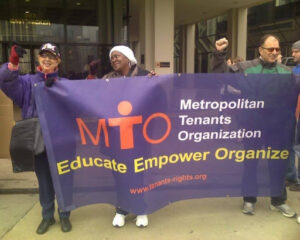 HUD tenants recently had concerns about bed bugs, issues with re-certification, retaliation by management, and the use of their community room in their building. Management at first did nothing to resolve the complaints. Tenants called MTO and building organizer David Wilson went to the building and informed them of their rights. Tenants in the Park Shore East building located at 6250 S. Harper then formed an association.
HUD tenants recently had concerns about bed bugs, issues with re-certification, retaliation by management, and the use of their community room in their building. Management at first did nothing to resolve the complaints. Tenants called MTO and building organizer David Wilson went to the building and informed them of their rights. Tenants in the Park Shore East building located at 6250 S. Harper then formed an association.
Tenants know that while committed individuals can make change, collective efforts are far stronger than the actions of individuals. The tenants association requested a meeting with management. Building management told the tenants they heard their issues and that they would be taken into consideration. At the next tenants’ association meeting, the leadership announced that the management brought in specially trained dogs to check for bed bugs and management agreed to extended time for the community room. It takes a tenants association to assert your rights, and organizing get the goods!
If you want to form a tenants association, call 773-292-4988 and request to speak with a community organizer.
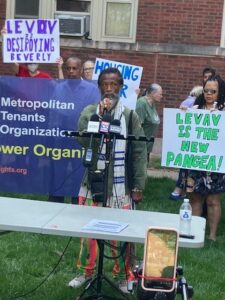
Organizing around tenant rights is about winning through building community and collaboration. We are proud of our work in helping tenants win our consistent victories in the city of Chicago. Check out several of our recent tenant organizing successes in this ever-growing list.
2024
2023
 We have good news Chicago! As spring descends on the city and peak moving season approaches, renters in Chicago have a great new tool at their disposal to use our free renters app, Squared Away Chicago, to track your issue(s) and communicate with your landlord. We’ve found the biggest obstacle for tenants trying to get problems remedied has been a lack of documentation. This app lets you upload photos & document issues, creating a lasting timeline that’s instantly accessible to you and your landlord!
We have good news Chicago! As spring descends on the city and peak moving season approaches, renters in Chicago have a great new tool at their disposal to use our free renters app, Squared Away Chicago, to track your issue(s) and communicate with your landlord. We’ve found the biggest obstacle for tenants trying to get problems remedied has been a lack of documentation. This app lets you upload photos & document issues, creating a lasting timeline that’s instantly accessible to you and your landlord!
Simply visit: www.squaredawaychicago.com
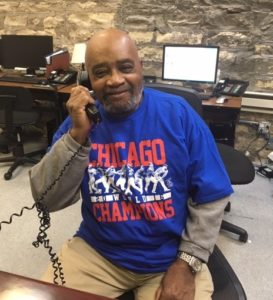 I was sad the day I learned that Mr. Green had passed. No one can remember the first day that Mr. Green began volunteering in the MTO office but it was a while ago, before we moved to our current location at 1727 S. Indiana. He first became involved with MTO because his HUD building was in terrible shape and he wanted to start a tenants association. He threw his whole self into organizing the tenants, who then voted him to be the association’s president. The tenants under his leadership gathered for monthly meetings, wrote and met with HUD officials, joined with other HUD tenants and even protested outside of HUD’s offices and in the end, the tenants won many of their demands. HUD paid for the rehab of his entire building.
I was sad the day I learned that Mr. Green had passed. No one can remember the first day that Mr. Green began volunteering in the MTO office but it was a while ago, before we moved to our current location at 1727 S. Indiana. He first became involved with MTO because his HUD building was in terrible shape and he wanted to start a tenants association. He threw his whole self into organizing the tenants, who then voted him to be the association’s president. The tenants under his leadership gathered for monthly meetings, wrote and met with HUD officials, joined with other HUD tenants and even protested outside of HUD’s offices and in the end, the tenants won many of their demands. HUD paid for the rehab of his entire building.
Mr. Green was so much more than president of Lake Vista Tenants’ Association. He was a dedicated volunteer who always gave to MTO. He would come to the office nearly every day to volunteer on the hotline, sharing his knowledge with thousands of tenants in need. Mr. Green was in many ways MTO’s messenger. His wheelchair was an MTO billboard hosting signs that read, ”Housing is a Human Right” or “Tenants Know Your Rights”. He collected thousands of signatures in support of the Source of Income laws for Section 8 tenants. He would pass out MTO know your rights flyers on buses, at rallies or in his neighborhood. Sometimes I would ask tenants how they heard of MTO. They responded, “The guy in the wheelchair gave me your number.”
For Mr. Green, it was MTO and the Cubs that stirred his passion. He was so happy the year Cubs finally won a world series. He came into the office with a huge smile on his face and said we did it. After a few high fives coupled with some baseball gossip, he sat down to begin answering tenants calls for help. There will never be another Mr. Green. To MTO and the tenants he helped, Mr. Green was a hero and a champion of tenants’ rights. by John Bartlett